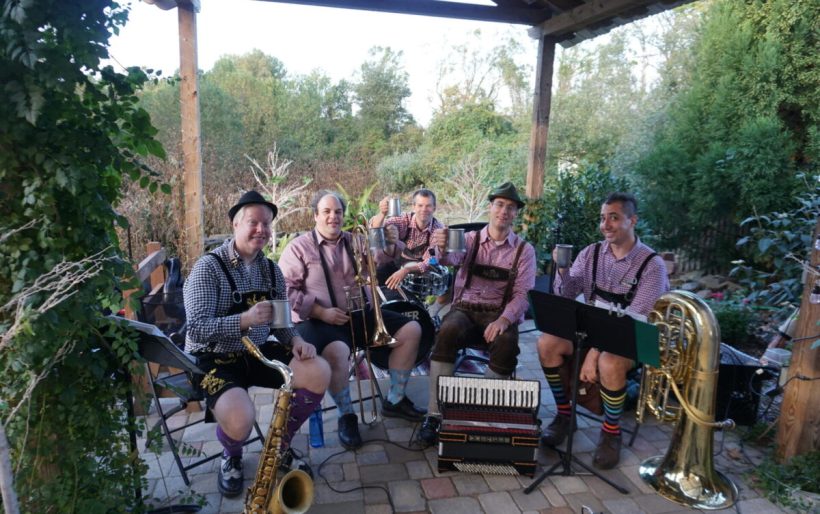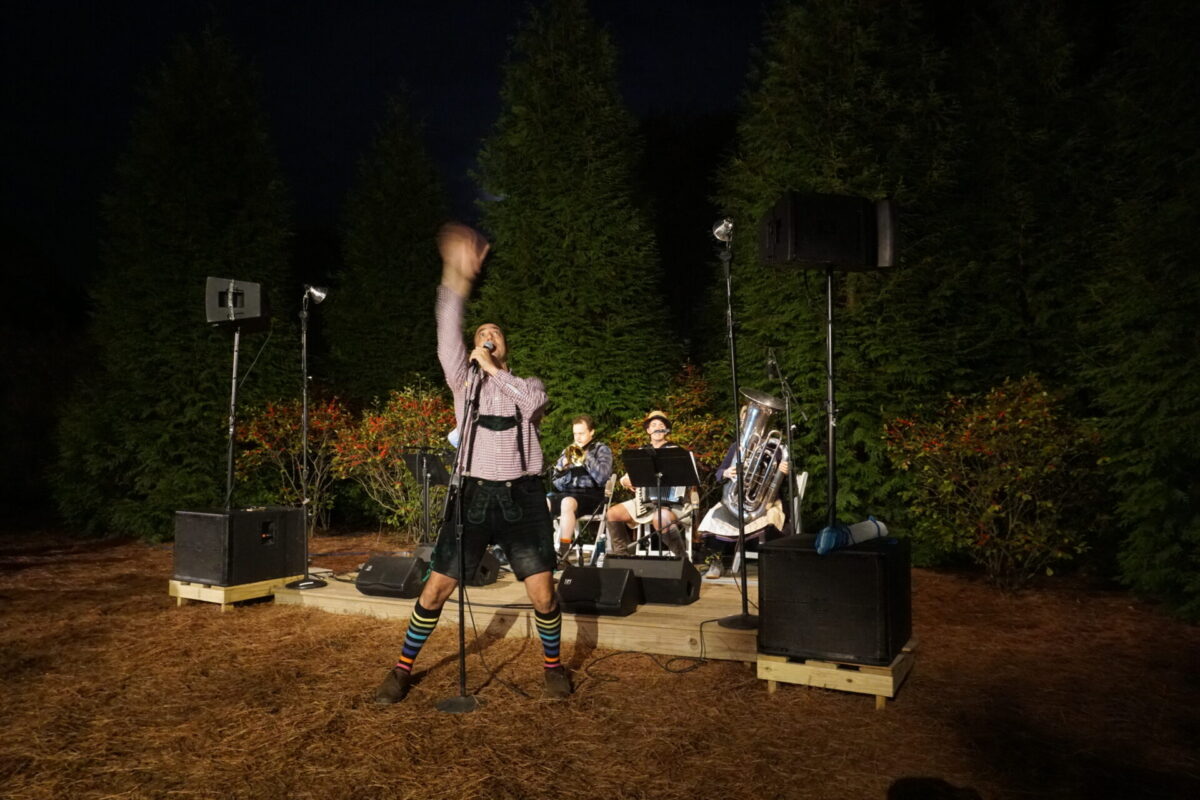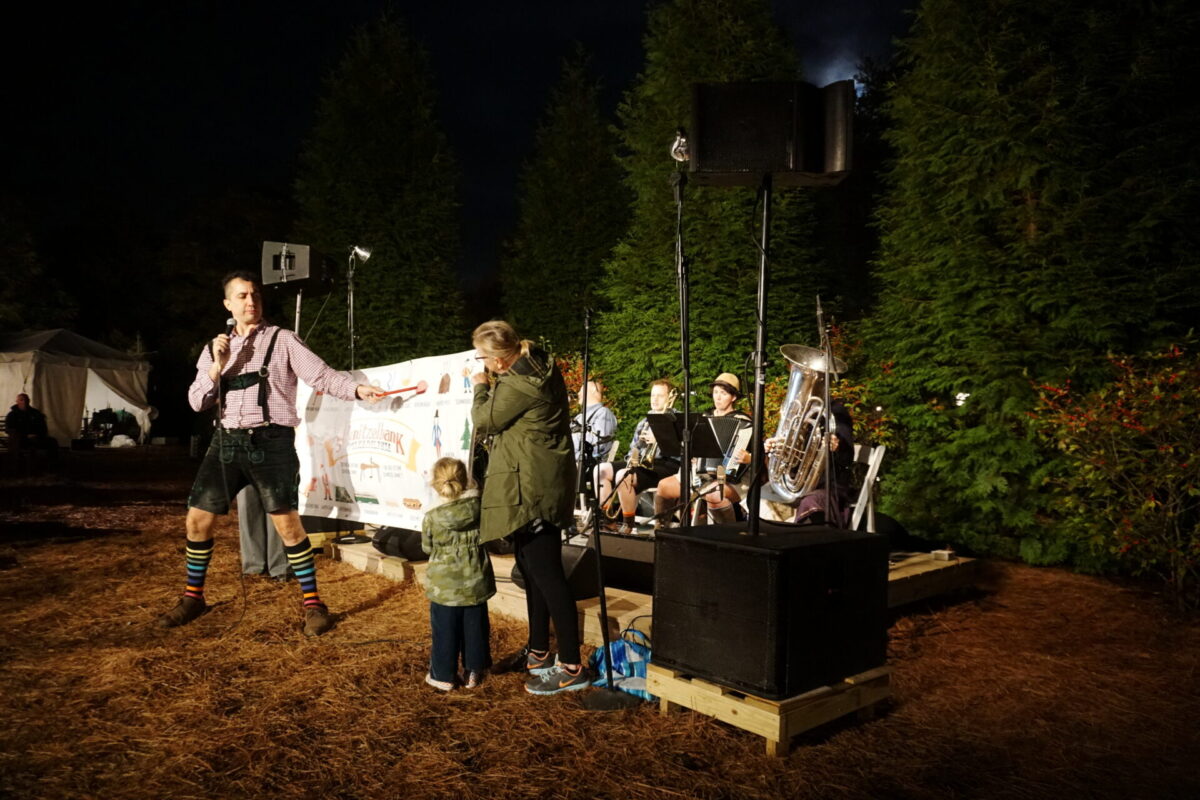
Polkadelphia brings polka to the masses, one Oktoberfest at a time
Dan Nosheny is the tuba player and bandleader of one of the city’s most successful polka bands in decades. The self-described Polka Kingpin of Philadelphia – he said that with a smile on his face, for the record – is driving home after a three gig day in the middle of an Oktoberfest season that will have him and his Polkadelphia bandmates zipping around the region playing as many shows as they possibly can.
Before this continues, let’s get a few things out of the way:
1. Polka music originated in Bohemia, which is now part of the Czech Republic. It made its way over to America with all variety of Eastern European immigrants of the 19th century and is considered a type of folk music on both sides of the Atlantic.2. Polka has influenced a ton of music over the past couple hundred years and was very important to the creation of Norteño in Mexico.
3. A polka is not just a song but is also a dance.
4. Despite what you may think, polka music is not a joke.
5. Despite not being a joke, polka music is very, very fun.
These are all things Nosheny found out when he founded Polkadelphia in 2014 and started to dive deep into things. Unlike many of his polka peers in Pennsylvania who might have been raised in Polish or German-American homes with at the very least a begrudging appreciation of the music, Nosheny only discovered the tunes as an adult.
The professional musician – you might recognize him from his time spent as the West Philly Orchestra sousaphonist – was playing occasional gigs with New York City-based polka bands a few years ago. He showed up to one of them and didn’t see any of the musicians he had played with in the past. Turns out they were all at a better paying show … in Philadelphia.
As he told The Key: “It’s really funny, there was definitely an entrepreneurial approach to building this band: there’s a hole in Philadelphia of people playing this kind of music in this kind of silly way. We should fill that hole. We did that pretty successfully.”
Considering the fact that Polkadelphia just finished an Oktoberfest where the band played an incredible 48 shows in two months, that’s not so much a brag as it is him pointing out the obvious. To pull that off Nosheny recruited a number of musicians to swell the ranks and allow the one band to split into as many were needed to make all those dates.
At the birth of Polkadelphia, Nosheny’s songbook was limited to the traditionals and the ‘polkafied’ pop songs he had learned from previous bands – ‘trad’ versus ‘non-trad’ polka if you want to get technical – and he quickly realized he had a lot of work to do. For a band leader, that means transcribing and arranging and transcribing some more.
It’s something he’s still doing. He offered up the “Dollar Dance” as a good example of this. “For years we were asked to learn the Dollar Dance song, which is a Polish tradition that’s from Western Pennsylvania, like the Pittsburgh area, where for a wedding people pay a dollar to dance with the bride and then form a bigger and bigger circle around her and then the groom has to fight his way through to get to her,” he explained. “It came up actually at an early wedding and I had no idea about it. ‘[Somebody asked] do you do the Dollar Dance?’ And we were, like, ‘Sure, we can do a dollar dance’ and we just did one of our other songs.”
He told The Key that “enough people read us the riot act about it” before he researched the tradition, found a YouTube video of the song – “Pani Mloda” – transcribed it, and put it into rotation. Arranging the covers the band does, which include favorites like “Country Roads Take Me Home” and “My Heart Will Go On” to songs from Metallica and Britney Spears, is also a process. While arduous and occasionally annoying, this has given Nosheny a better understanding of polka and certainly a greater love and respect for it.
With the level of musicianship needed to play polka, “there’s no way it couldn’t be this really deep thing,” Nosheny said. Asked if there was anything that surprised him about the genre, he said, “I think it’s been the vastness of the body of work, the vastness of the repertoire on every side of what I’ve been talking about.” And like he discovered with the “Dollar Dance,” fans are quick to point out when the band doesn’t know how to play something.
The “Schnitzelbank” – a German-American song that was written ostensibly as a tool to teach German to kids, complete with a painted banner the bandleader will point at during the performance – and “Das Fliegerlied” – “The Aviator Song,” a dance number about someone who is having such a good time they feel like they’re flying around the clouds with a whole barnyard of animals – are two polka tunes that are very much Polkadelphia mainstays. But when the band first started and people requested them, Nosheny had no clue what they were asking for. “They said, ‘Oh, you have to learn what that is!’” he recalled — and so he did, and now has his own Philadelphia-themed “Schnitzelbank” banner that includes Boyz II Men, William Penn, Michael Schmidt, and of course a steak käse mit.

At its core, polka is music for beer halls and as such it’s inherently a good time. If it’s not you’re doing something wrong.
While a lot of people might be familiar with polka because of “Weird Al” Yankovic’s polka-style medleys, Nosheny referenced a different Yankovic as inspiration: Frankie. An accordion player who rose to prominence in the 1940s and was known as “America’s Polka King” – probably where Nosheny borrowed his more tongue-in-cheek title – during a storied career that spanned decades and landed him multiple awards, including a 1986 Grammy. You know, back when the Grammys had a polka category.
“The Frankie Yankovic stuff, the sound he gets out of some of those things is just beautiful,” he said. “It’s this amazing groove that is so tight.”
The easiest way to understand the role Polkadelphia plays both in the Philly music community and for the many, many polka fans who live in the region, one just has to look at the three very different shows Nosheny and his bandmates played on the day of this interview, all in the West Chester area.
The first gig was in the afternoon at a retirement home. Those shows are “always super fun because they’re people who sing along,” he said. He explained that song choice tends to “skew a little more traditional” for those audiences, meaning more “Ein Prosit” and less “Oops I Did It Again.” Still, they managed to work some Beatles into the set, which he said went over very well. “That was super exciting to shake this up, this thing that these people care very much about,” he said, describing the polkafied cover. “They really like that music and to show that there’s other things that can fit in there and it still works [is] something I’m sharing with them at that point.”
The second show, just a couple hours after the first, was at a wedding reception out in the West Chester countryside. This was more of a standard Polkadelphia performance with pop covers – including a rousing version of “Paint It Black” – traditionals, and a lot of toasts auf Deutsch to the happy couple. Despite not speaking German, Nosheny has learned the songs by rote and does such a good job with them that he regularly has to deal with people who assume he’s fluent, something that happened after the wedding.
While the band might not be “authentic” – whatever that means when it comes to a genre of music that is just as hyphenated in its Eastern European-American identity as the musicians who have been at its foundation for the past century – they also don’t try and pretend to be something they’re not. This is polka for polka’s sake made by people who appreciate the music and absolutely love playing it.

Dan Blacksberg has been part of the Polkadelphia roster for the past few years. The trombonist is principally known as a klezmer and jazz player, and like most of the people in the band wasn’t immersed in polka before joining. Still, there is some crossover between klezmer and polka, and Blacksberg told The Key he was familiar with the music through that as well as his own interest in Banda, a subgenre of Norteño that incorporates brass instrumentation.
Something about playing polka that he enjoys is being able to work within the traditional melodies and finding aspects of the songs he can make his own. “It’s sort of like writing my own parts,” he said. Depending on the lineup of the band he’s playing in that day, “some people are more interested in just laying it down and some people are more interested in mixing it up and adding little stuff.”
Nosheny echoed that sentiment. He spoke about how it was important for him to make the music his own by playing the songs at different tempos or even just his own work adding in popular tunes he loves to the band’s repertoire.
Though the members’ background might keep them from getting booked at any of the German cultural clubs in the area, there are bands like the Philadelphia German Brass Band that Nosheny admits might be more appropriate for shows like that. “I love what they do,” Nosheny said about the band, which was founded way back in 1935. “But it’s so steeped in the tradition that it’s hard to get outside of it.”
For him, polka is great not just for the traditional melodies but because “so many things can be juxtaposed on top of them,” he explained. “So anything can be turned into this and that means I get to play music that I wouldn’t normally play in this environment.”
Polka has always been fun, and this feels like just as valid as anything else going on in a genre that’s embraced creativity. He pointed out that the “Fliegerlied” was a viral hit when it first came out a little more than a decade ago. So his arrangement of another hit song, Robyn’s “Call Your Girlfriend,” doesn’t seem too out of place, especially when it goes over well with the audience. “The people who do catch it, I see phones immediately go up,” he said. “It’s, like, ‘Oh my God, this band is really doing that!”
The band’s final show that day was at their regular Oktoberfest stomping grounds at Longwood Gardens, where they performed numerous times this month. At that gig Nosheny wasn’t playing the tuba, but instead was leading the audience in a number of sing-a-longs, something he definitely has a lot of fun doing. The crowd on that chilly night was clearly there to have fun and many were singing and clapping along with a few people even dancing.
“I am consistently surprised that at every show we have done, with one exception, at least one person has done the ‘Fliegerlied,’” Nosheny said. “And I’m like, ‘Really, you’re going to make these really weird gestures? You’re going to do this?’”
Lori Friedgen-Veitch is one of those people. She was at the Longwood Oktoberfest and excitedly volunteered to hold up the “Schnitzelbank” banner during the performance of that song. She grew up in a polka-loving German-American family and told The Key how, “My grandmother had alzheimers and when she was 103 and had forgotten many things, she still remembered her German music and we would sing together.”
According to her, dancing to the music is something anyone can do: “You don’t have to be a great dancer to enjoy dancing the polka.” And while she has a personal connection to the history and culture, she stressed that polka is for everyone. “It resonates with so many people even when it’s not their cultural background,” she said.
Nosheny agreed. He told The Key how when Polkadelphia plays events like Musikfest in Bethlehem, which has bands performing from a variety of genres and backgrounds, he’ll notice people in the crowd who are definitely unfamiliar with the music but get won over not just by the band but by the polka fans there. “Once the dance floor fills up and people are doing real polkas,” he said, there’s a feeling that, “I don’t care how cheesy this song is or even how ridiculous of a polka that you’re actually playing, I can dance to this.”
He explained that “polka is not exotic, it’s very familiar” It doesn’t matter if the band is playing the “Liechtensteiner Polka” or a polkafied version of “Africa” by Toto, the end result is the same. As polka fan Friedgen-Veitch put it: “It makes you want to tap your feet, clap your hands, smile, and get up and bounce.”
The final Polkadelphia performance of the season is November 2nd at Roundtop Mountain Resort in Lewisberry, PA.
